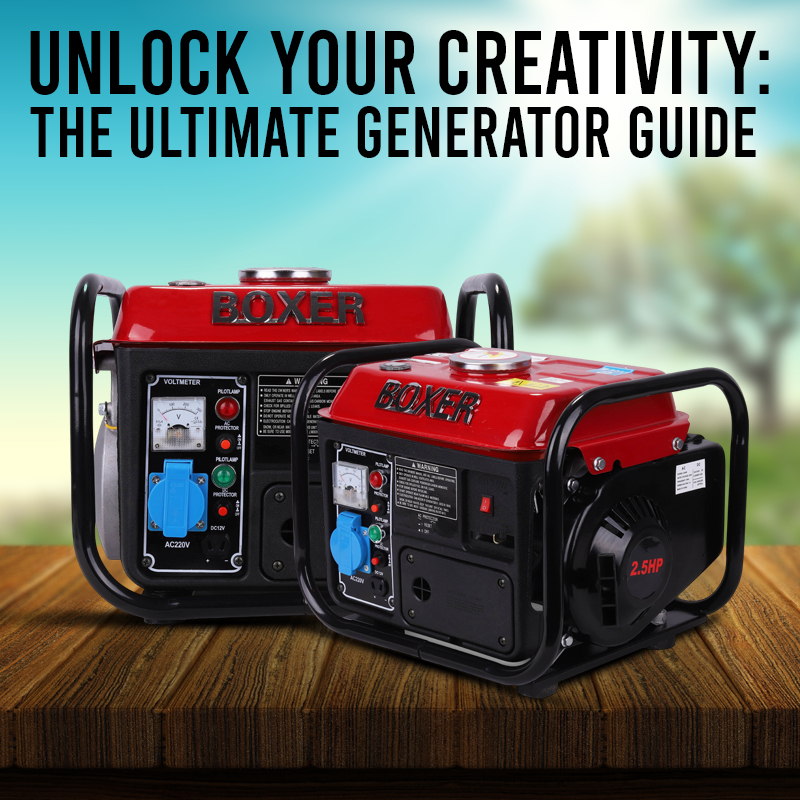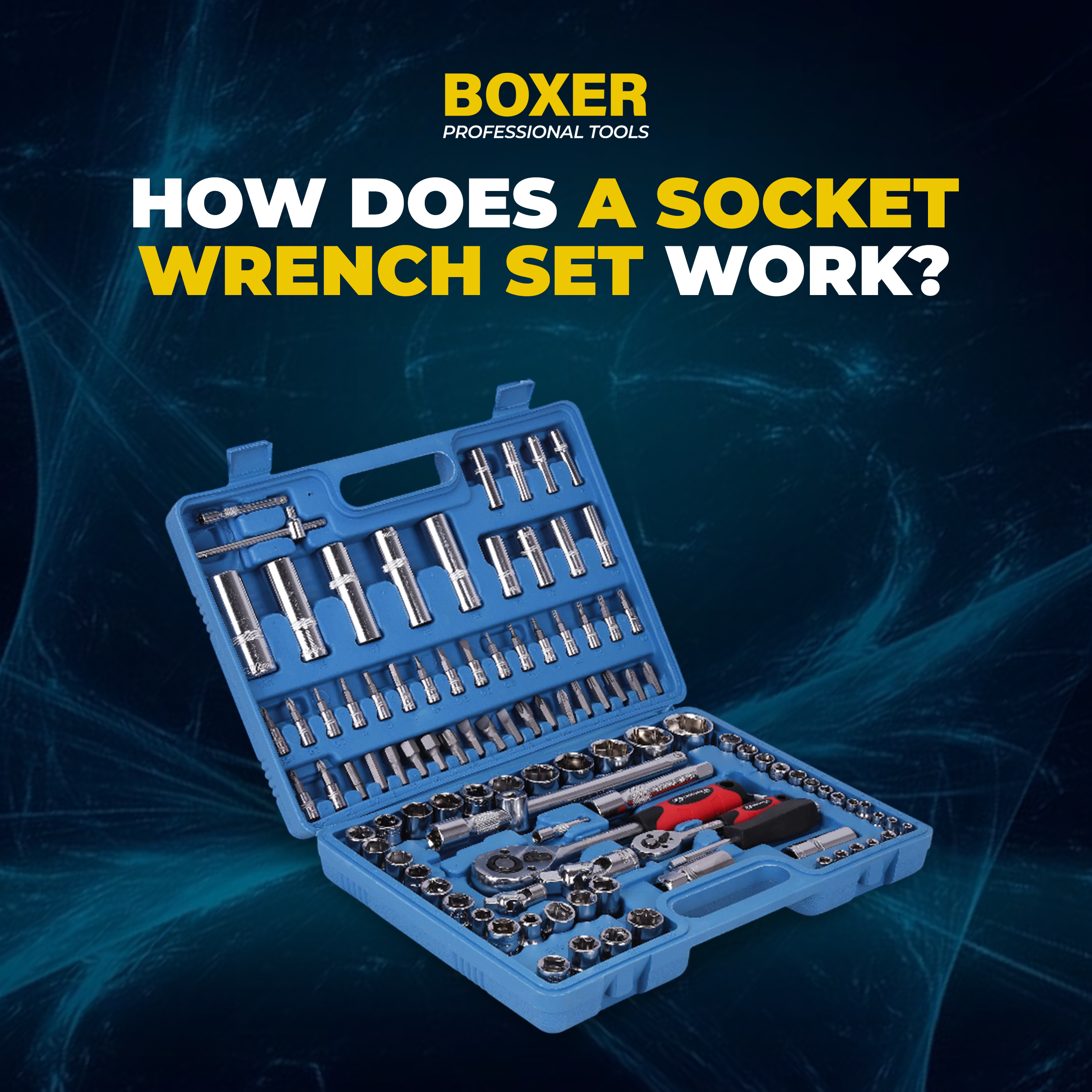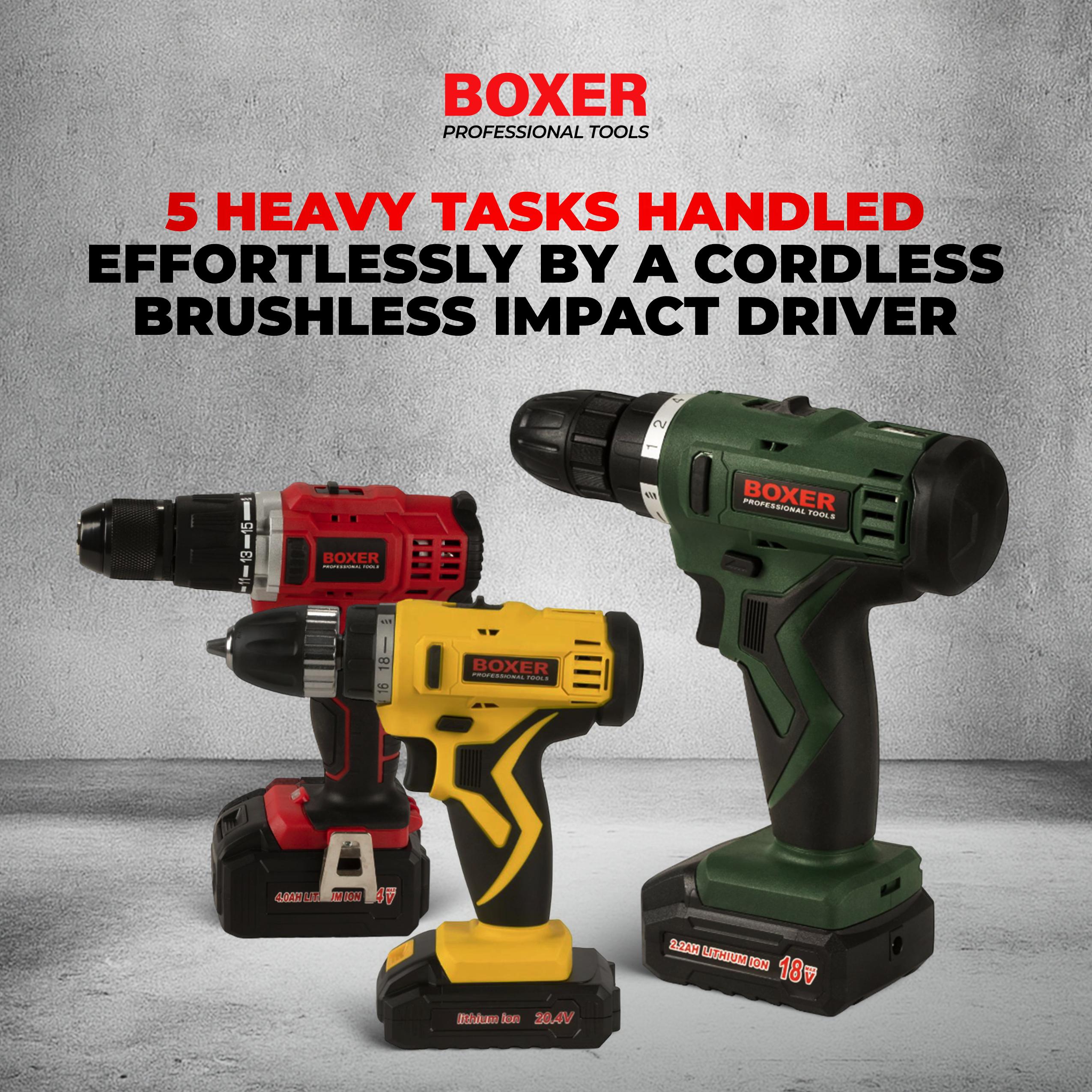
Unlock Your Creativity: The Ultimate Generator Guide
In the realm of crafting, construction, and DIY projects, having the right tools can be the difference between a vision and a masterpiece. Boxer Tools understands this, and we're here to equip you with not just tools, but knowledge. Today, we delve into the world of generators, those unsung heroes powering your creative endeavors.
Whether you're a seasoned craftsman, a hobbyist, or an outdoor enthusiast, understanding the intricacies of generators can significantly enhance your experience. This comprehensive guide will explore the different types of generators, their applications, safety considerations, and how to choose the perfect generator for your needs.
What is Generator?
A generator is essentially a machine that converts mechanical energy into electrical energy. This electrical energy can power a wide range of devices, from lights and tools to appliances and electronic equipment. Generators are indispensable in areas without a stable power supply or during power outages.
Types of Generators
Portable Generators
Portable generators are compact and easily transportable units designed for powering small appliances and tools. They are ideal for camping, tailgating, construction sites, and emergency power needs.
Key Features:
- Lightweight and compact design
- Easy to start and operate
- Typically fueled by gasoline or propane
- Offer varying wattage outputs to suit different needs
- Often equipped with handles and wheels for easy transportation
Industrial Generators
Industrial generators are heavy-duty machines built for continuous operation and high power output. They are commonly used in construction sites, factories, hospitals, and data centers to provide reliable electricity.
Key Features:
- Robust and durable construction
- High power output capacity
- Can be fueled by diesel, natural gas, or propane
- Equipped with advanced control systems and monitoring features
- Often require professional installation and maintenance
Diesel Generators
Diesel generators are known for their fuel efficiency, long run times, and durability. They are suitable for applications requiring continuous power, such as remote locations, farms, and backup power systems.
Key Features:
- Efficient fuel consumption
- Longer run times compared to gasoline generators
- Suitable for heavy-duty applications
- Often used in harsh environments
- Require regular maintenance and quality diesel fuel
Inverter Generators
Inverter generators produce clean, stable electricity, making them ideal for powering sensitive electronic devices like laptops, smartphones, and medical equipment. They are quieter and more fuel-efficient than traditional generators.
Key Features:
- Clean and stable power output
- Quiet operation
- Fuel-efficient
- Suitable for powering sensitive electronics
- Typically smaller and lighter than traditional generators
Standby Generators
Standby generators provide automatic backup power during power outages. They are installed permanently and connect to your home's electrical system for seamless operation.
Key Features:
- Automatic transfer switch for seamless power restoration
- Various power capacities to suit different home sizes
- Can be fueled by natural gas, propane, or diesel
- Require professional installation and maintenance
- Provide peace of mind during power outages
Choosing the Right Generator
Determining Your Power Needs
The first step in selecting a generator is to assess your specific power requirements. This involves identifying the essential devices and appliances you need to operate and their corresponding wattage.
- Calculate Total Wattage: Add up the wattage of all devices you plan to run simultaneously.
- Consider Surge Wattage: Some devices, like motors, require a higher initial power surge.
- Leave Room for Growth: Account for potential future power needs.
Fuel Type Considerations
The choice of fuel for your generator depends on factors such as availability, cost, storage, and environmental impact.
- Gasoline: Widely available, easy to start, but less efficient and with shorter run times.
- Diesel: More efficient, longer run times, but requires higher-quality fuel and can be more difficult to start in cold weather.
- Propane: Clean-burning, easy to store, but often has lower power output compared to gasoline or diesel.
- Natural Gas: Environmentally friendly, continuous fuel supply, but requires professional installation.
Generator Size and Portability
The size and portability of a generator depend on your intended use and mobility needs.
- Portable Generators: Compact and lightweight, ideal for camping, tailgating, and small job sites.
- Industrial Generators: Larger and heavier, designed for continuous operation and high power output.
- Standby Generators: Permanently installed for backup power during outages.
Noise Level
Noise levels can be a significant factor, especially if you're using the generator in residential areas or campsites.
- Inverter Generators: Known for quiet operation.
- Traditional Generators: Can be noisy, especially at higher loads.
Run Time Requirements
Consider how long you need the generator to operate without refueling.
- Factor in Load: The generator's run time will decrease as the load increases.
- Fuel Tank Capacity: Larger fuel tanks provide longer run times.
Additional Features
Some generators offer additional features that can enhance their usability and safety.
- Electric Start: Convenient for easy starting.
- CO Detector: Protects against carbon monoxide poisoning.
- Outlet Configurations: Choose the types of outlets you need (standard, GFCI, RV).
- Wheel Kit: Facilitates easy transportation.
By carefully considering these factors, you can select the generator that best suits your specific needs and preferences.
Generator Safety: Prioritizing Your Well-being
Carbon Monoxide Poisoning Prevention
Carbon monoxide (CO) is a deadly gas produced by generators. Proper ventilation is crucial to prevent CO poisoning.
- Outdoor Operation: Always operate the generator outdoors in a well-ventilated area, away from windows, doors, and vents.
- CO Detectors: Consider using a CO detector in areas where the generator is used.
- Symptoms: Be aware of CO poisoning symptoms like headache, dizziness, nausea, and fatigue.
Fire Safety
Generators pose fire hazards if not handled carefully. Follow these precautions:
- Spark Ignition: Keep flammable materials away from the generator, including gasoline, paper, and dry leaves.
- Overloading: Avoid overloading the generator, as it can cause overheating and fire.
- Fuel Storage: Store gasoline in approved containers away from the generator and heat sources.
- Electrical Safety: Connect the generator to a properly grounded outlet.
Electrical Safety
Improper electrical connections can lead to electric shock and equipment damage.
- Grounding: Ensure the generator is properly grounded to prevent electrical shock.
- Extension Cords: Use heavy-duty extension cords rated for the generator's wattage.
- Outlet Protection: Protect outlets with ground fault circuit interrupters (GFCIs).
- Wet Conditions: Avoid operating the generator in wet or damp conditions.
Child and Pet Safety
Generators can be dangerous to children and pets.
- Supervision: Never leave a running generator unattended, especially around children and pets.
- Fencing: Consider fencing off the generator area to prevent access.
- Education: Teach children about the dangers of generators.
By following these safety guidelines, you can significantly reduce the risks associated with generator use and protect yourself and others.
Generator Applications: Unleash Your Creativity
Construction and DIY Projects
Generators are indispensable tools for powering equipment and tools on construction sites and for DIY enthusiasts tackling home improvement projects.
- Power Tools: Run drills, saws, sanders, and other power tools for efficient work.
- Lighting: Illuminate work areas with portable lights for improved visibility and safety.
- Welding Equipment: Power welders for various metalworking tasks.
- Compressors: Operate air compressors for nailing, stapling, and inflation.
Outdoor Events and Recreation
Generators bring convenience and enjoyment to outdoor gatherings and recreational activities.
- Camping: Power lights, refrigerators, and cooking equipment for comfortable camping experiences.
- Tailgating: Provide power for TVs, sound systems, and food preparation at sporting events.
- RVing: Ensure a reliable power supply for appliances and electronics while on the road.
- Outdoor Parties: Power lighting, sound systems, and other entertainment equipment.
Emergency Preparedness
A generator can be a lifeline during power outages, providing essential power for safety and comfort.
- Home Essentials: Power refrigerators, freezers, lights, and heating or cooling systems.
- Medical Equipment: Operate life-saving medical devices like oxygen concentrators.
- Communication: Charge phones and other communication devices.
- Security Systems: Maintain security with alarm systems and surveillance cameras.
Off-Grid Living
For those seeking self-sufficiency, generators offer a reliable power source.
- Home Appliances: Power refrigerators, stoves, and other household appliances.
- Water Pumps: Supply water for daily needs.
- Workshops: Power tools and equipment for various projects.
- Backup Power: Provide a secondary power source for emergencies.
By understanding the diverse applications of generators, you can harness their power to enhance your projects, outdoor experiences, and overall quality of life.
Generator Maintenance: Keep Your Powerhouse Running Smoothly
Regular Oil Changes
Engine oil lubricates the internal components of your generator, preventing wear and tear.
- Check Oil Levels: Regularly check the oil level using the dipstick.
- Change Oil: Follow the manufacturer's recommended oil change intervals.
- Use Proper Oil: Use the type and viscosity of oil specified by the manufacturer.
Air Filter Maintenance
A clean air filter ensures optimal engine performance and fuel efficiency.
- Inspect Regularly: Check the air filter for dirt and debris.
- Clean or Replace: Clean or replace the air filter as needed.
- Follow Manufacturer's Guidelines: Refer to the owner's manual for specific cleaning instructions.
Spark Plug Inspection and Replacement
Spark plugs ignite the fuel-air mixture in the engine.
- Inspect Spark Plugs: Check for wear, fouling, or damage.
- Gap Adjustment: Ensure the spark plug gap is correct according to the manufacturer's specifications.
- Replace as Needed: Replace worn or damaged spark plugs.
Fuel System Care
Proper fuel storage and handling are essential for generator performance and longevity.
- Fuel Stability: Use fuel stabilizers to prevent fuel degradation during storage.
- Fuel Storage: Store gasoline in approved containers in a cool, dry place.
- Fuel Treatment: Add fuel stabilizers to the generator's fuel tank before storage.
Battery Maintenance
The battery provides power for starting the generator.
- Check Battery Level: Regularly check the battery's charge level.
- Charge Battery: Charge the battery if it's low.
- Clean Battery Terminals: Keep battery terminals clean and corrosion-free.
Cooling System Inspection
The cooling system prevents the generator from overheating.
- Check Coolant Levels: Monitor the coolant level and add coolant as needed.
- Clean Radiator: Remove debris from the radiator fins.
- Inspect Hoses and Belts: Check for cracks, leaks, or wear in hoses and belts.
By following these maintenance practices, you can extend the life of your generator and ensure reliable performance when you need it most.
Generator Accessories: Enhance Your Experience
Generator Covers
Protect your generator from the elements and extend its lifespan with a durable generator cover.
- Weather Protection: Shields your generator from rain, snow, dust, and debris.
- Material: Choose a cover made from waterproof, breathable fabric.
- Custom Fit: Ensure the cover is the right size for your generator.
Extension Cords
Expand your generator's reach with high-quality extension cords.
- Wattage Rating: Select cords with a wattage rating that matches your generator's output.
- Length: Choose the appropriate cord length for your needs.
- Outdoor Use: Opt for outdoor-rated extension cords for safe outdoor use.
Power Inverters
Convert AC power from your generator to DC power for electronic devices.
- Wattage Capacity: Choose an inverter with sufficient wattage for your devices.
- Pure Sine Wave: Opt for pure sine wave inverters for sensitive electronics.
- Output Ports: Select an inverter with the appropriate number and types of output ports.
Wheel Kits
Make transporting your generator easier with a wheel kit.
- Load Capacity: Ensure the wheel kit can handle the weight of your generator.
- Tire Quality: Choose durable tires for rough terrain.
- Handle Design: Look for a comfortable and ergonomic handle.
Generator Enclosures
Reduce noise and protect your generator with a generator enclosure.
- Sound Reduction: Choose an enclosure with effective sound dampening.
- Ventilation: Ensure proper ventilation to prevent overheating.
- Material: Select a durable and weather-resistant material.
Fuel Management Accessories
Improve fuel efficiency and convenience with fuel management accessories.
- Fuel Tanks: Additional fuel tanks for extended run time.
- Fuel Stabilizers: Prevent fuel degradation during storage.
- Fuel Gauges: Monitor fuel levels accurately.
By utilizing these accessories, you can enhance your generator's performance, safety, and convenience, making it a valuable asset for your projects and outdoor activities.
Generators are versatile tools that can empower your creativity and provide essential power when needed. By understanding the different types of generators, safety practices, and maintenance tips, you can make informed decisions and maximize the benefits of this valuable equipment.
Boxer Tools is committed to providing you with the highest quality generators and tools to support your projects. Visit our website to explore our range of products and receive expert advice.
Copyright © 2026 Boxertools | Powered By Orance Media Group








